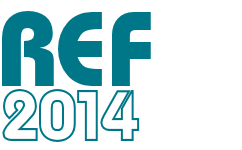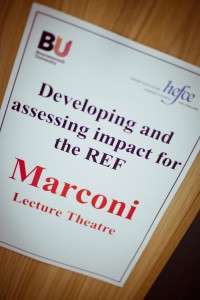 BU will be hosting a half day Research Excellence Framework (REF) event, supported by the REF team, on 22 February 2012 to which all staff are invited to attend.
BU will be hosting a half day Research Excellence Framework (REF) event, supported by the REF team, on 22 February 2012 to which all staff are invited to attend.
Book your place now by completing the online registration form
This event follows hot on the heels of the first REF event held at BU on 19 May 2011, to which over 150 delegates from 39 institutions attended (see our previous blog post – The excellent REF event at BU!).
The sector-wide consultation on the proposed REF panel criteria closed earlier this month and the final documents are due to be published in January 2012. This event will provide an update on the current developments with the REF and the confirmed REF panel documentation, focusing specifically on the assessment of impact within each of the four Main Panels.
The event will be open to BU staff and external delegates and the provisional programme is shown below.
| Time | Activity |
|---|---|
| 09:30 – 10:00 | Coffee and registration |
| 10:00 – 10:30 | REF Team overview of the assessment framework Chris Taylor, Deputy REF Project Manager, REF Team |
| 10:30 – 11:00 | Similarities between the four Main Panel working methods and criteria Professor Stephen Holgate, Chair of Main Panel A |
| 11:00 – 11:30 | Morning break |
| 11:30 – 12:15 | Panel specifics, differences and impact assessment There will be concurrent sessions, one for each of the four Main Panels. Attendees choose which one to attend.
|
| 12:15 – 13:00 | Panel Q&A session with all participants |
| 13:00 – 14:00 | Lunch, networking and close |
The event is free to attend but booking is essential.
Book your place now by completing the online registration form
 RASG – The REF Academic Steering Group (RASG) has been established as the primary decision-making body for the BU REF preparations. It first met on 14 June 2010 and normally meets on a monthly basis. The RASG Terms of Reference (including a list of members) can be accessed via the I-drive.
RASG – The REF Academic Steering Group (RASG) has been established as the primary decision-making body for the BU REF preparations. It first met on 14 June 2010 and normally meets on a monthly basis. The RASG Terms of Reference (including a list of members) can be accessed via the I-drive. Bibliometrics pilot – HEFCE ran a pilot exercise in the construction of bibliometric indicators of research quality in 2008-09, using
Bibliometrics pilot – HEFCE ran a pilot exercise in the construction of bibliometric indicators of research quality in 2008-09, using  The REF will assess research excellence through a process of expert review, informed by indicators where appropriate. It will be based on HEIs submitting evidence of their research activity and outcomes, to be assessed by expert panels.
The REF will assess research excellence through a process of expert review, informed by indicators where appropriate. It will be based on HEIs submitting evidence of their research activity and outcomes, to be assessed by expert panels.
 Last week BU hosted a HEFCE-supported event for universities in the south of England outlining recent changes in how the quality of research in higher education is assessed.
Last week BU hosted a HEFCE-supported event for universities in the south of England outlining recent changes in how the quality of research in higher education is assessed. Professor Peter Taylor-Gooby (University of Kent), Professor Roy Harrison (University of Birmingham), Professor James Goodwin (Age UK), Dr Kathryn Monk (Environment Agency Wales) and Dr Mari Williams (RCUK) presented their experiences of assessing impact case studies in the REF pilot exercise. Professor Jim Griffiths (University of Plymouth) presented his experience of identifying and submitting impact case studies to the pilot exercise in the hope that others would learn from his experience.
Professor Peter Taylor-Gooby (University of Kent), Professor Roy Harrison (University of Birmingham), Professor James Goodwin (Age UK), Dr Kathryn Monk (Environment Agency Wales) and Dr Mari Williams (RCUK) presented their experiences of assessing impact case studies in the REF pilot exercise. Professor Jim Griffiths (University of Plymouth) presented his experience of identifying and submitting impact case studies to the pilot exercise in the hope that others would learn from his experience.










 Second NIHR MIHERC meeting in Bournemouth this week
Second NIHR MIHERC meeting in Bournemouth this week Dr. Ashraf cited on ‘Modest Fashion’ in The Guardian
Dr. Ashraf cited on ‘Modest Fashion’ in The Guardian NIHR-funded research launches website
NIHR-funded research launches website MSCA Postdoctoral Fellowships 2025 Call
MSCA Postdoctoral Fellowships 2025 Call ERC Advanced Grant 2025 Webinar
ERC Advanced Grant 2025 Webinar Horizon Europe Work Programme 2025 Published
Horizon Europe Work Programme 2025 Published Horizon Europe 2025 Work Programme pre-Published
Horizon Europe 2025 Work Programme pre-Published Update on UKRO services
Update on UKRO services European research project exploring use of ‘virtual twins’ to better manage metabolic associated fatty liver disease
European research project exploring use of ‘virtual twins’ to better manage metabolic associated fatty liver disease